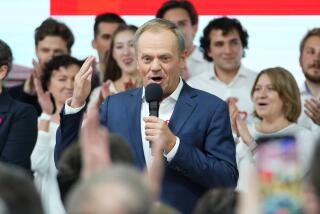Solidarity, Peasants’ Party Weigh Alliance
- Share via
WARSAW — Representatives of Solidarity and the United Peasants’ Party, the Communists’ most important partner, met Thursday to explore the possibility of a Peasants-Solidarity alliance that could threaten the Communists’ ability to form a government.
The meeting followed a suggestion by Solidarity leader Lech Walesa that two parties allied with the Communists--the Peasants and the Democratic Party--form a coalition that would place the Communist Party, in power for 45 years, in the opposition in Parliament.
But although both parties have welcomed talks “to clear up positions” with Solidarity, neither has unequivocally embraced the idea of such a coalition.
Leadership Division
The hesitancy to change allegiance reflects a division in the leadership of the minority parties but is also a tool to pressure the new premier, Gen. Czeslaw Kiszczak, into giving a larger share of Cabinet appointments to the Peasants and the Democrats.
Kiszczak, who was elected premier Aug. 2, is expected to present his Cabinet appointments for parliamentary approval on Aug. 23 or 24.
The Peasants’ Party has been pressing Kiszczak for the Cabinet posts of deputy premier and four others, plus increased representation throughout the government. The party’s leader, Roman Malinowski, complained Wednesday that, so far, only two of the party’s members had been suggested for Cabinet posts.
The Peasants mounted a short-lived rebellion last week over Kiszczak’s election, and the party’s firebrand parliamentary floor leader, Aleksander Bentkowski, predicted that the overwhelming majority of the party’s 76 members would vote against Kiszczak. But the Communist leadership held an emergency closed-door meeting with Peasants and Democratic members of Parliament and, in the end, both delegations held to the party line. Kiszczak won by a vote of 237 to 173.
Bentkowski met with Kiszczak on Thursday afternoon. The Solidarity newspaper, Gazeta Wyborca, said the meeting was arranged so that Bentkowski could tell Kiszczak that most of the Peasants delegation would vote against Kiszczak’s appointments. However, it was also possible that they discussed Peasants’ Party appointments in the Kiszczak government.
Met With Solidarity
A small group of Peasants’ Party lawmakers met privately Thursday with Solidarity caucus leaders in what both sides described as “an exchange of views.”
“We’re at the beginning of the beginning,” said Solidarity Sen. Jaroslaw Kaczynski, who said he was attending the meeting as Walesa’s representative.
Solidarity’s parliamentary leader and foremost strategist, Bronislaw Geremek, was attending a three-day conference in Italy, and it was not likely that any major moves would be made by Solidarity in his absence.
‘Deeply Divided’
There are still strong reservations within the Solidarity leadership over the wisdom of forming a government, meanwhile. At a Solidarity caucus Wednesday, Deputy Ryszard Bugaj acknowledged that Solidarity was “deeply divided” on the question of forming a government.
And despite Bentkowski’s insistence that Walesa’s proposal represents “the most important decision the (Peasants’ Party) has had to face in 40 years,” his nominal superior, Malinowski, has reacted more calmly toward the proposal.
The Democratic Party, whose 27 votes could give a comfortable margin to a Solidarity-Peasants coalition, appeared to be taking a similarly cautious approach. The party’s leadership, while welcoming a meeting with Solidarity, said in a statement that any debate on a new government “must take into account . . . the political and legal fact that (Parliament) has elected a premier who was assigned the mission of forming a government.”
More to Read
Sign up for Essential California
The most important California stories and recommendations in your inbox every morning.
You may occasionally receive promotional content from the Los Angeles Times.










